Your car’s air-conditioning system has one job—to keep you cool. But during a summer scorcher, it may seem like it’s barely up to the task. And even at those times, it’s eating up gas: The EPA estimates that using A/C in very hot conditions can reduce fuel economy by as much as 25 percent for a conventional vehicle. (It also zaps battery life in electrics and hybrids.)
Here’s why: Whenever you flip the switch, the system pulls in air from either the cabin or outdoors, extracts the heat and moisture from it, and pushes it out through vents. And the heart of this system is a compressor, which draws energy from the engine. So whenever you’re using the A/C, the engine has to work harder—and you burn more fuel.
But a few easy tips can help you save gas—and money—while making you feel cooler faster. Here’s what the pros recommend.
Park Smart
A car’s A/C system can only reduce the cabin temperature by approximately 40 degrees on average, says Jill Trotta, head of industry advocacy and sales for RepairPal. (Though of course, the longer you drive, the cooler the air will become.) If you park in a shady spot, the interior will start out cooler and the A/C will have less work to do. If the cabin is warm, roll down the windows and let the hot air escape before you rev up the A/C.
Set It To Recirculate
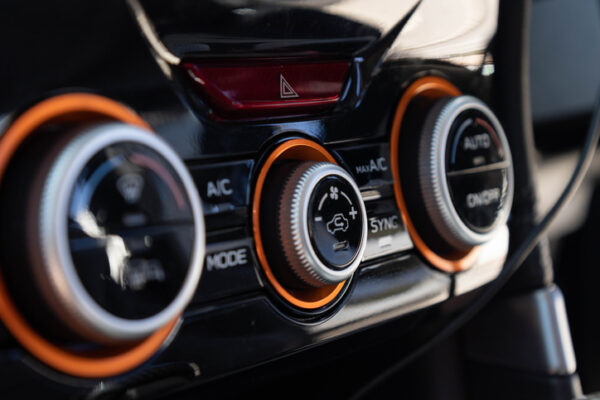 “Recirculation is probably the best way to maximize the A/C,” says Trotta. The benefit of recirculation is that the A/C system is pulling air only from within the cabin. So if it’s roasting outside but you already have the cabin down to a pleasant 72 degrees, the A/C will have to chill only that cooler air within the car. You’ll save on gas, too: Once the interior reaches the set temperature, the A/C compressor will turn off, reducing the load on the engine.
“Recirculation is probably the best way to maximize the A/C,” says Trotta. The benefit of recirculation is that the A/C system is pulling air only from within the cabin. So if it’s roasting outside but you already have the cabin down to a pleasant 72 degrees, the A/C will have to chill only that cooler air within the car. You’ll save on gas, too: Once the interior reaches the set temperature, the A/C compressor will turn off, reducing the load on the engine.
Skip Pre-Cooling
It may be more comfortable to cool your car before you’re underway, but running the A/C when the car’s not moving is highly inefficient. “Air conditioning will perform optimally when there’s airflow, like when you’re driving down the road,” says Timothy Hatcher, director of technical operations for the Automotive Maintenance & Repair Association. So wait until you’re already cruising before you turn it on. In an electric or hybrid, pre-cooling reduces the battery life, so either avoid the practice or stay plugged into the charger when you do it.
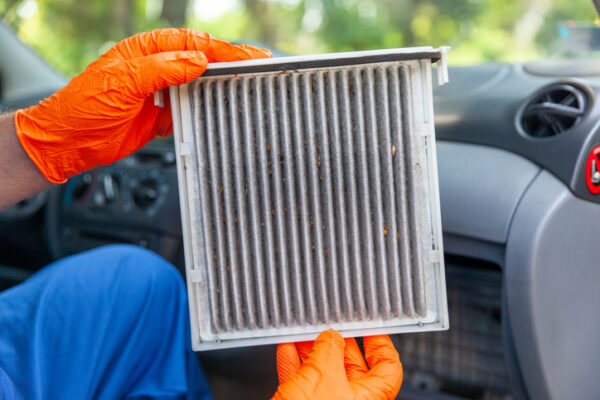 Change Your Cabin Air Filters On Schedule
Change Your Cabin Air Filters On Schedule
The cabin air filters remove dirt and dust from the air that comes out of the vents. When a filter gets dirty, it restricts the air trying to pass through, says Hatcher. So replace the cabin air filters according to the schedule in your owner’s manual, which is probably every year or two, or every 15,000–20,000 miles.
Don’t Ignore Leaks
The biggest misconception about A/C systems, says Hatcher, is that if they’re low on refrigerant, you just need to add more (a process called recharging). But the system is sealed; nothing should be going in or out. “Adding refrigerant isn’t normal, and it isn’t maintenance,” says Hatcher. “It’s an indication of some other issue.” If yours is low, visit a professional certified in air-conditioning maintenance and repair to check it out.
Another way to keep your cool (and peace of mind)? Download the GEICO Mobile app for help at your fingertips—from roadside assistance to help finding your car and more!
Read more: Check out these other smart ways to get better gas mileage.
By Julie Anne Russell

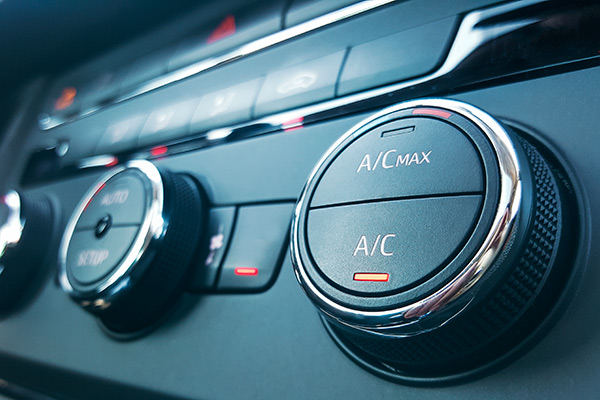



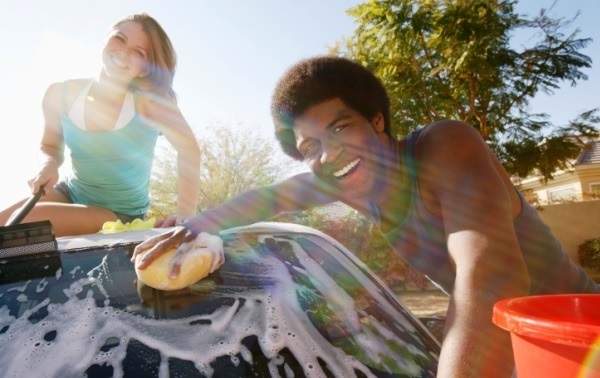
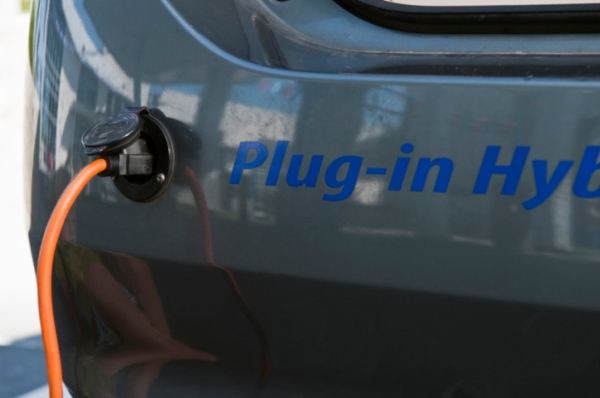

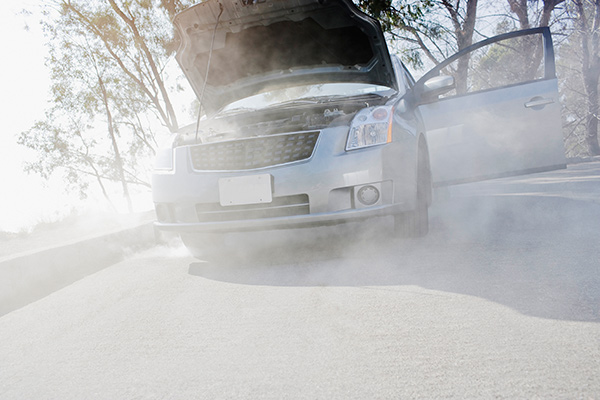
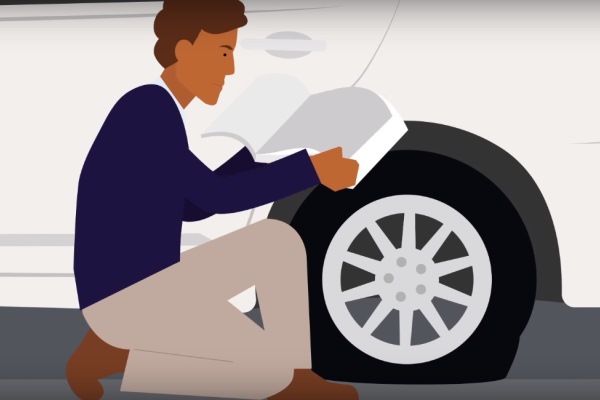
Robert Morris says,
I always have great service with geico and the tips are very helpful thank you….
Helen Y Chon says,
These are great tips
Teresa Bryan says,
Thanks! I had not thought of recirculating the air. Makes a lot of sense.
Rhodedia says,
Hello: I have been driving a car for over 20 years, and I am still learning new things, Thank you so much for these great automobile tips, especially to set the AC to recirculate the inside cabin air. to decrease engine work load, and therefore decrease gas use. I didn’t even know until a year ago that you should change the cabin air filter after 15,000-20,000 miles. I also wasn’t aware that the AC refrigerant was encased, and should not have to be refilled , and that when a mechanic refills it , it is because there s a leak. Even when I am waiting for a red light in light traffic I try to stop in spots where there is shade, I also always try to park my auto in the shadiest spot on the street.
LaWaune Netter says,
This is helpful – thank you!
Clara Nevels says,
Thank you so much will put my windows down until the car cool off,
Have a Bless Day
CingPi says,
Thank you so much for the very helpful information. May God bless you always!
Margie says,
Thanks!
Truman says,
I find that leaving windows open just a crack for a few minutes at the beginning of your drive helps push the hot air out. Then close tight after cooling has started. Also, engine efficiency, thus gas mileage, will actually be better above about 50 mpg with A/C on as opposed to windows open because wind drag is reduced.
Edmilson Lima says,
Very good service, thanks
Anthony Davis says,
Thank-you for the tips and smart advice on maintenance and car insurance and car buying Thank-you and GOD BLESS.
Veronica says,
Thanks for the great tips
Kevin A Wright says,
Thanks for information really helpful.
cynthia clarke says,
thank you for the helpful information and the negative comment from the individual didn’t have to be so nasty.
Jesse Olsen says,
Really? Nothing about considering buying white car with light cloth interior instead of leather, using a uv repelant visor when parked or tinting windows.